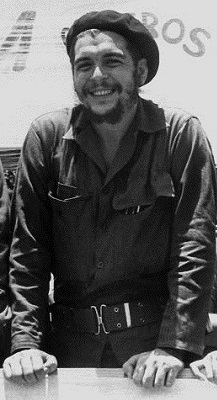|
~ Ernesto Che Guevara
~ Galéria
~ Oldal
~ Bejelentkezés
~ Vissza a Főoldalra
Ernesto Che Guevara, az argentin származású forradalmár, miniszter, gerillavezér és író, Buenos Aires-ben szerzett orvosi diplomát, majd a kubai forradalom során jelentős szerepet játszott a szigetország felszabadításában és újjáépítésében. A kubai gazdaság talpraállításáért dolgozott, küzdött az oktatás és az egészségügy fejlesztéséért, az írástudatlanság és a faji előítéletek felszámolásáért. Saját példájával népszerűsítette az önkéntes munkát. Kongóban és Bolíviában is harcolt - harminckilenc éves volt, amikor az amerikai-bolíviai csapatok csapdába ejtették és kivégezték.
| | |
|

| | |
|
|
|
What You Don't Know About Cuba Tells You About YOUR Future
|

|
|
My wife, Peggy and I and 14 Berea College students are leaving for three weeks in Cuba beginning on Monday (May 5th). We'll return on the 25th. So I probably won't be writing here till then.
Last Wednesday night, Thursday evening, as well as Friday morning and afternoon, Dr. Cliff Durand -- the co-founder of the Center for Global Justice in San Miguel de Allende, Mexico -- helped us all understand what we're getting into. Cliff has been leading delegations to Cuba for the last 25 years. He's an honorary member of the faculty at the University of Havana.
Here are some of the salient ideas he shared:
1. One cannot understand Cuba's revolution without understanding neo-colonialism. Neo-colonialism refers to the dynamics of control whereby "former" colonies continue to be governed by their colonial masters even after "independence." The control remains because the now-liberated colony continues its economic relationships with its "mother country." Of necessity, these relationships foster a dependency similar to that which characterized the original colonial relationship.
[Read the whole article]
|
|
|


| | |
|
|
|
~ Ernesto Che Guevara
~ Gallery
~ Site
~ Log in
~ Back to the Main page
Ernesto Che Guevara, the Argentine-born revolutionary, minister, guerrilla leader and writer, received his medical degree in Buenos Aires, then played an essential part in the Cuban Revolution in liberating and rebuilding the country. He did his best to set up the Cuban economy, fought for the improvement of the education and the health system, the elimination of illiteracy and racial prejudice. He promoted voluntary work by his own example. He fought in the Congo and in Bolivia - he was thirty-nine years old, when he was trapped and executed by the joint American-Bolivian forces.
| | |
|
|

